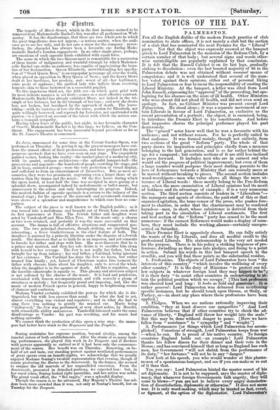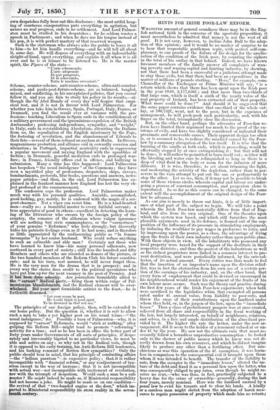TOPICS OF THE DAY.
PALMERSTON.
FOR all the English dislike of the modern French practice of club nomination to state offices it is not merely a club but the section of a club that has nominated the next Premier for the "Liberal" party. Not that the object was expressly avowed at the banquet given to Lord Palmerston in the mansion of the Reform Club, by a certain number of that body ; but several signs and words other- wise unintelligible are popularly explained by that conclusion. It is felt that the Russell Cabinet is on its last legs, gradually sinking to dissolution : even the last boasted majority of 46 in the Palmerston debate was not obtained without unusual means of compulsion; and it is well understood that several of the num- ber voted against their opinions, either out of personal liking to Lord Palmerston or fear to incur the responsibility of ousting the Liberal Ministry. At the banquet, a letter was cited from Lord John Russell, expressing his " approval " of the proceeding, but apo- logizing for his absence on the score of ill health. Other Ministers who were absent did not plead ill health, and did not even send an apology. In fact, no Cabinet Minister was present except Lord Palmerston. He stood alone; it was a separate movement of cer- tain Liberals in favour of Lord Palmerston, as exclusive as the recent presentation of a portrait; the object, it is surmised, being, - to introduce the Premier Elect to his constituents. And before that impassive chorus the principal performer played his part dexterously. The " graced " actor knew well that he wag a favourite with his audience ; and not without reason. For he is perfectly suited to that audience. It was formed mainly, though not entirely, from two sections of the great " Reform " party. The whole of that party draws its inspiration and principles chiefly from a measure belonging to the last generation, and is so far rather behind the age for a vanguard ; but certain sections of it are still less inclined to press forward. It includes men who are in earnest and who would aid the progress of political improvement; but even of them a large number would postpone their most darling pursuits to the love of forbearance towards a Ministry that can scarcely move or be moved without breaking to pieces. The second section includes word-worshipers—men who value above all things the mere ut- terance of Liberal words : these mostly belong to the Prx-Reform wra, when the mere enunciation of Liberal opinions had its merit of boldness and its advantage of example : it is a very numerous section. The third section consists of traders in " Liberalism"— the managers and agents of elections, the paid staff of this or that organized agitation, the tame censor of the press, who pushes fore- most to chastise, in order that the chastisement may be rendered harmless—men, in short, whose subsistence is derived from their taking part in the circulation of Liberal sentiments. The first and best section of the " Reform " party has ceased to be the most numerous : if the earnest Reformers would make a display of num- bers, they must include the working-filasses—certainly unrepre- sented on Saturday. Their Premier Beet is appositely chosen. He can hilly satisfy the wants of the lip Liberals, and does all needful credit to the professional Liberals. His statesmanship is the very art needed for the purpose. There is in his policy a striking largeness of pro- fessions, dwindling as they pass into pledges and fining to a point in action. Submit his words in this last bLiquet speech to the crucible, and you will find these points as the substantial residue. 1. Professions. The objects of Lord Palmerston have been "the interests of this country," "which involve the wellbeing of every other country." It is the duty of Ministers "to protect our fel- low subjects in whatever foreign land they may happen to be" it is their duty "to assist other countries in endeavouring to at- tain the political position which we occupy." [This last profession was cheered loud and long : it boles so bold and generous ! It 4 rather general: Lord Palmerston was debarred from mentioning specific instances, lest he should touch upon Greece, or Sicily, or Turkey, or—in short any place where these professions have been applied.] Pledges. When we see nations rationally improving their condition, "they at least deserve our sympathies" ! And Lord Palmerston believes that if other countries try to cheek the ad- vance of liberty, "England will throw her weight into the scale." But this may be done without danger to peace. [Here we have fallen from " assistance " to " sympathy " and "weight."] 3. Performances [or things which Lord Palmerston has accom- plished]. Conscious of strength Lord Palmerston keeps from war —when he can. He is proud Of his native country. To foreign countries England holds out—an example ! Lord Palmerston thanks his fellow diners for their dinner and their vote in the House ; and has convinced himself that so long as England has such men, her Government "will not shrink from the performance of its duty," "her fortunes" will not be in any "danger." Now look at his speech, you who would wonder at this phteno- menon of a spontaneous banquet, and see if you can make m re out of it than that
Yes, you say : Lord Palmerston hinted the master secret of his art diplomatic. It is not to be supposed, says the master of diplo- macy, that whenever foreign Governments talk angrily, they will come to blows—" you are not to believe every angry demonstra- tion of dissatisfaction, diplomatic or otherwise." It does not mean war. It is only word-making, which may be treated as fact, event, or figment, at the option of the diplomatist. Lord Palmerston's own despatches fully bear out this disclosure : the most artful heap- ing of courteous exasperatives puts everything in agitation, but causes no real progress, ends in no settlement. And Lord Palmer- ston must be studied in his despatches ; for he seldom wastes a speech in Parliament ; and when he does use his tongue instead of his pen, it is with perfect mastery of that reserved weapon. Such is the statesman who always asks the public to leave it all to him—to let him handle everything—and he will tell all about it, some day. He will dispose of everything with an indescribable sleight-of-hand, upset everything, and explain it all when it is all over and he is at leisure to be listened to. He is the master spirit, the Figaro of the state-
" L'arte schermendo,
L'arte adopt-undo Di qua pungendo, Di la scherzando, Tutto le machine rovesciera."
Scheme, counter-scheme, anti-counter-scheme, ultra-anti-counter- scheme, and paido-post-fitturo-scheme, are so balanced, tangled, mixed, and conflicting, in his unexplained policies, that you cannot follow it, and you are fain to study his policy in its results,—al- though the Sir Abel Handy of every day will despise that empi- rical test, and it is not in favour with Lord Palmerston. For whether you take him in Greece, Spain, Portugal, Italy, France, or Denmark, you find the result ever at variance with the pro- fessions: teaching Liberalism to Spain ends in the establishment of a military government and the ignominious expulsion of the British Ambassador; professing independence, sympathy, and "weight," in Italy, ends m reestablishing Absolutism, alienating the Italians from us, the repudiation of the English missionary by the Pope, the fostering of revolution, and the abandonment of Liberals to their fate—several of them refused an asylum at Malta. In Greece, magnanimous protection and alliance end in cowardly coercion and alienation; in Portugal, impartial neutrality ends in suppressing a popular movement and mixing England with the squabbles of faction ; in Denmark, peaceful mediation ends in prolonged war- fare ; in France, friendly offices end in offence, and bullying in submission. Many a time has this happened : lord Palmerston has bespoken "the usual indulgence" of the Commons ; they have seen a mystified play of professions, despatches, ships, envoys, bombardments, protocols, blue books, questions and answers, news- paper articles—and then, in the end, Lord Palmerston has ex- plained in the frankest manner how England has lost the very ob- ject 'professed at the commencement.
The confession caps the profession. Lord Palmerston makes much way with his personal qualities. Amiable, accomplished, good-looking, gay, manly, he is endowed with the magic of a ser- pent-charmer. Not a viper can resist him. He is a kind-hearted man--really so ; a bountiful master to every faithful servant ; a true appreciator of good in others—excellent in detecting the learn- ing of the litterateur who swears by the foreign policy of the country, the romance of the alderman where vulgar ignorance will see nothing but civic commonplaces, or the " earnestness " of your genuine "Reformer," who feels strongly, but discreetly hides his patriotic feelings even as if he had none, and is therefore as little appreciated liy the undiscerning public as " la femme ineomprise " by her coarse husband. Who could refuse anything to such an estimable and able man ? Certainly not those who have learned to know him—his many personal adherents, now scattered in every part of society ; still less the hundred and fifty Members and others who are recorded as donors of the picture, or the two hundred members of the Reform Club his future constitu- ents: and in his turn, rest assured, he will never forget them. He is the very man for the drama that is in prospect; and in every way the choice does credit to the political speculators who have put him up for the next vacancy in the post of Premier. And it has been done adroitly. Are journalists formidably allied to the "earnest" Radical party,—bring them within range of Pal- merstonian blandishments, and the Radical element will be over- whelmed. Bid your most formidable satirist to the feast,—he is forthwith disarmed.
"Let your ocean be port,
He would think it good sport To be drowned in that red sea."
The principles of our foreign policy, then, will be extended to our home policy. But the question is, whether it is safe to allow such a man to take a yet higher post on his usual terms—" the usual indulgence," &c. Possibly a turn of Palmerston—who, it is supposed by "earnest" Reformers, would "stick at nothing," after gulping the Reform Bill—might tend to promote "reforming" activity for a time ; and as he has been in office the better part of forty years under Governments of all sorts of principles, if despe- rately and irrevocably bigoted to no particular views, he must be able and active on any ; so why not in the Radical vein, though it is opposed to his early training, his Anti-Reform-Bill tendencies, and his lurking remnant of Rotten Row sympathies ? Only the public should bear in mind, that his principle of conducting affairs —the "helium paratum "—is expensive policy ; that it is rather incompatible with "financial reform," or any readjustment of tax- ation except in the way of increase ; that it is not incompatible with actual war—not incompatible with incitement of revolution, nor with the triumph of despotism. Would such a man be a safe master P He might indeed be made so, if Ministerial responsibility had not become a joke. He might be made so on one condition— the revival of that "two-handed engine at the door," which im- parted to Ministerial responsibility its stern reality in the seven- teenth century.



























 Previous page
Previous page